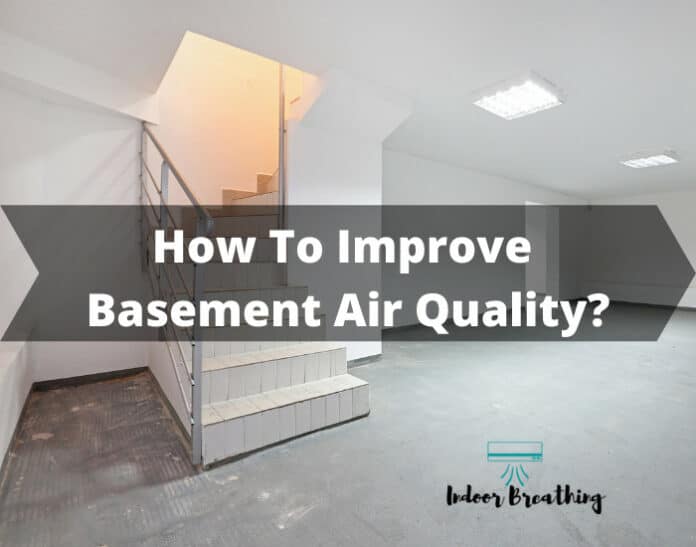Air quality issues are familiar with basements. If you have one, you might have already dealt with this problem. The most frequently occurring problems include high-level musty odors, dampness, and dust.
If you have to deal with that unpleasant basement odor regularly, you are not alone. You might think that this area of your home might never stay odorless and clean.
But think again!
This guide will list some essential tips for improving the basement air quality. I will share some tips to clean the basement and other related info that will come in handy regarding purifying the air in the basement.
So, scroll down to read all you need about cleaning your basement.
Table of Contents
10 Tips on Improving Basement Air Quality
1. Cleaning Up Any Clutter In Your Basement
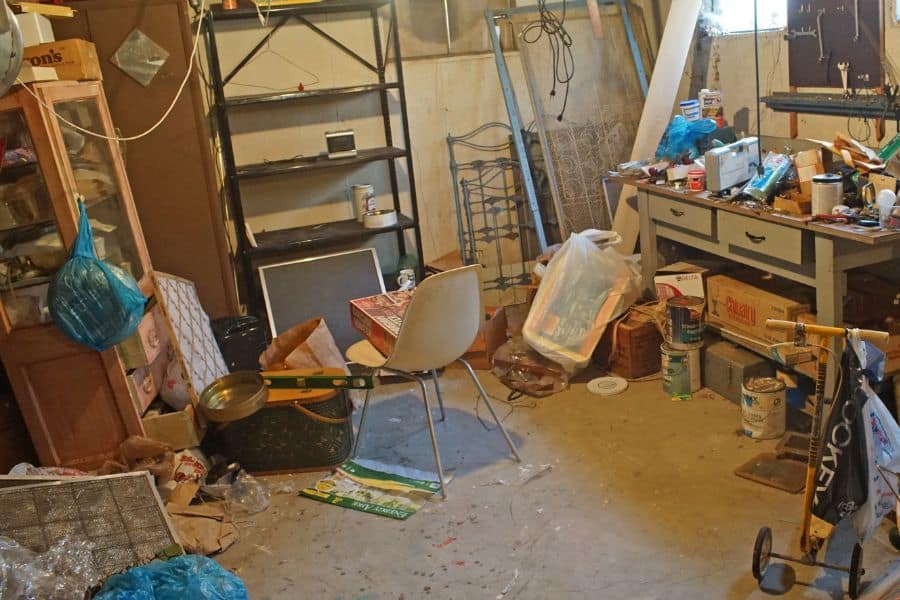
The first thing you need to do is remove any clutter in your basement. Most of us use our basements as storage rooms, and then we forget about them till they turn to dust.
You need to remove those old boxes, newspapers, and books because they can harbor mold and attract pests like rodents and termites.
You can always call a cleanup service if you don’t want to deal with the dirty work. But, unfortunately, this rubbish is one of the primary contributors to poor air quality in your basement.
It is better to section your basement and work on each area turn by turn. But make sure that you are wearing gloves and a face mask if you choose to do the cleanup job independently.
2. Cleaning the Air In Your Basement
Cleaning your basement air is the simplest way to maintain the air quality in this area of your home. And To do that, you will have to invest in a quality air purifier.
An air purifier is a device that can circulate air through its filters. It can strip out all the contaminants in the air around your basement. These contaminants include microscopic particles like allergens, bacteria, mold spores, and others.
But you will need a unit with various features for creating the cleanest possible air. These features include carbon filters, HEPA filters, and UV light.
Combining these features can decrease up to 99.9 percent of harmful airborne particles. With these filters, an air purifier can eradicate particles up to 0.3 microns in size and effectively remove musty smells and kill off germs.
You will also need to go for the proper size of your unit according to the size of your basement. It will ensure you don’t go for a unit that is too small or too big for your basement space.
3. Drying Out Your Basement
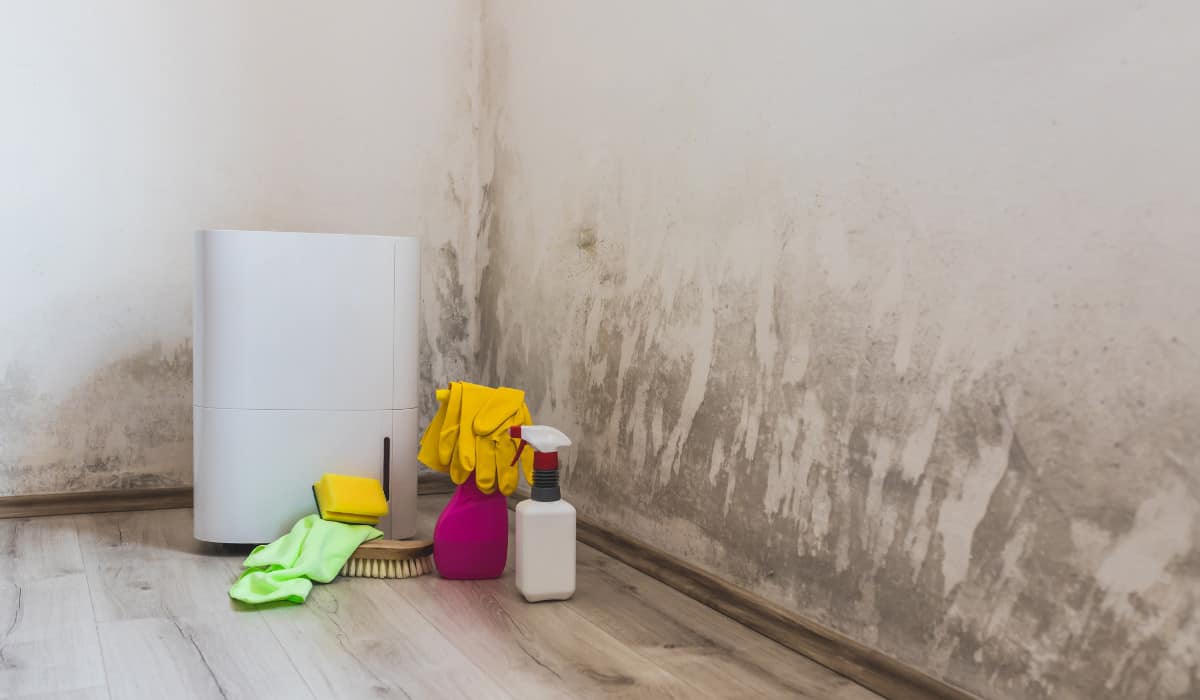
Most issues with the air quality in your basement are caused by humidity and dampness. Therefore, if you can dry your basement out, you will eliminate most of these issues causing musty smells. Doing so will also stop that itchy feeling you might have experienced when you go downstairs.
When a basement has increased humidity in the air, it also promotes mildew and mold growth. If you have an unfinished basement, you will notice mildew and mold on the ceiling, walls, joists, and floors.
Even in finished basements, you might not see obvious signs of mildew or mold, but you might smell them. It is because mildew or mold hides behind carpeting, ceiling covers, and drywall.
Mildew and mold are not just odorous, but they can also cause a range of different health issues. These can be sneezing, coughing, eye irritation, allergic reactions, and nasal congestion.
To prevent mildew and mold, you have to dry out your basement. It is because mildew or mold needs moisture to survive and will die in the absence of humidity.
The easiest step you can take here is using a dehumidifier in your basement. This unit will reduce the relative humidity present in your basement air.
The ideal level of humidity that you need in your basements ranges between 30 percent to 50 percent. Any humidity level under 50 percent will not let mold survive.
For more information about drying out your basement, please read our article here about 7 ways to dry out a damp basement.
4. Proper Ventilation
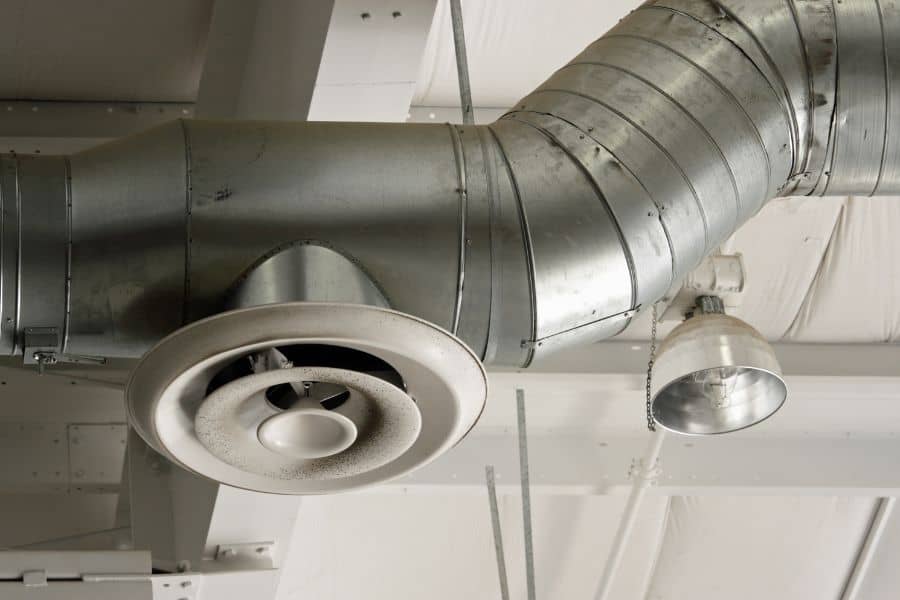
The basement has bad air quality because they don’t have proper ventilation. As a result, the air stays trapped within your basement and doesn’t circulate with the cleaner air outside.
To improve your basement’s ventilation and air quality, you can install a mechanical ventilator to bring in fresh air from outside. These systems don’t need windows, and most are quite energy-efficient.
However, the only downside with these units is that they can be expensive and need professional installation.
Therefore, you have to get a qualified HVAC professional to get the job done. It’s a good investment as long as you can afford it. But you can get similar results by using a dehumidifier and an air purifier within your basement.
5. Keeping the Windows Closed
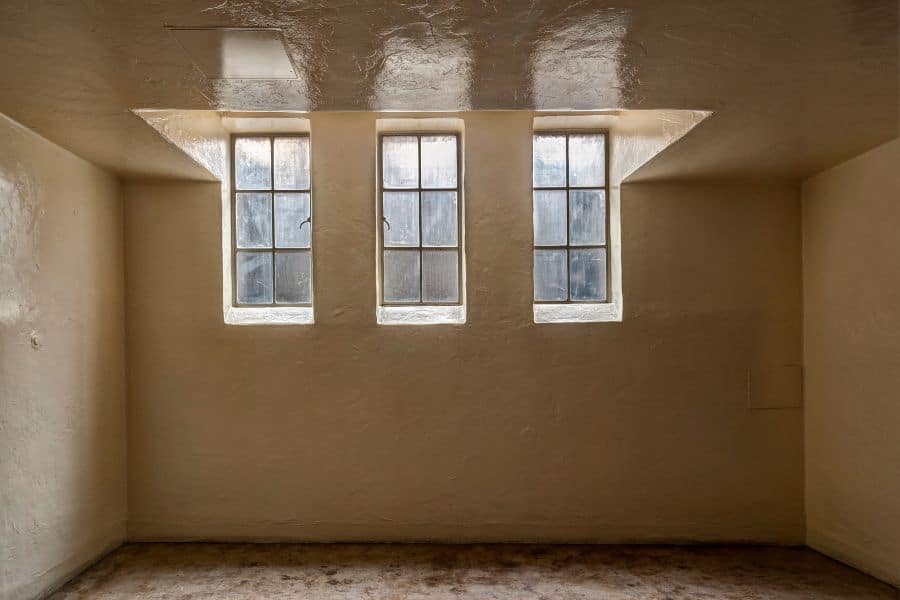
If there are windows in your basement, you might think about opening them to improve the overall air quality in your basement. But that might not always work.
During summer, this is especially the case when humidity rises and allergens are more prevalent in the outdoor air. Opening your basement windows might cause the indoor humidity level to rise.
As a result, mold will start growing and draw allergen particles in. In addition, it pollutes the indoor air. So the best advice is to keep your basement windows closed if you have any.
6. Seal Up Those Gaps And Cracks
Just like opening any basement window, any gaps or cracks around the foundation walls of your basement, doors, or windows might increase humidity levels.
And it can result in contaminated air flowing into your basement. To protect your basement’s air quality, it is best to seal up all those gaps and cracks in those areas using expanding foam or caulk.
7. Removing Those High VOC Contributors
Most of us use these basements to store different chemicals and other solvents. These include stains, paints, gasoline, and lacquers. But, of course, most basements have pretty poor ventilation.
The fumes from these chemicals, called VOCs (volatile organic compounds), can build up and increase the toxic levels in the air quality. The best move you can make is to remove these VOC contributors from your basement and place them in an outdoor shed or garage because they have better ventilation.
You can also throw away some solvents and chemicals if you will not immediately use them. This way, you can further reduce your potential exposure to any dangerous fumes.
You can consider buying air quality monitors to assess the VOC levels in your basement. This device will measure the air quality and identify any problems with your air quality.
8. Using Less Volatile Paint
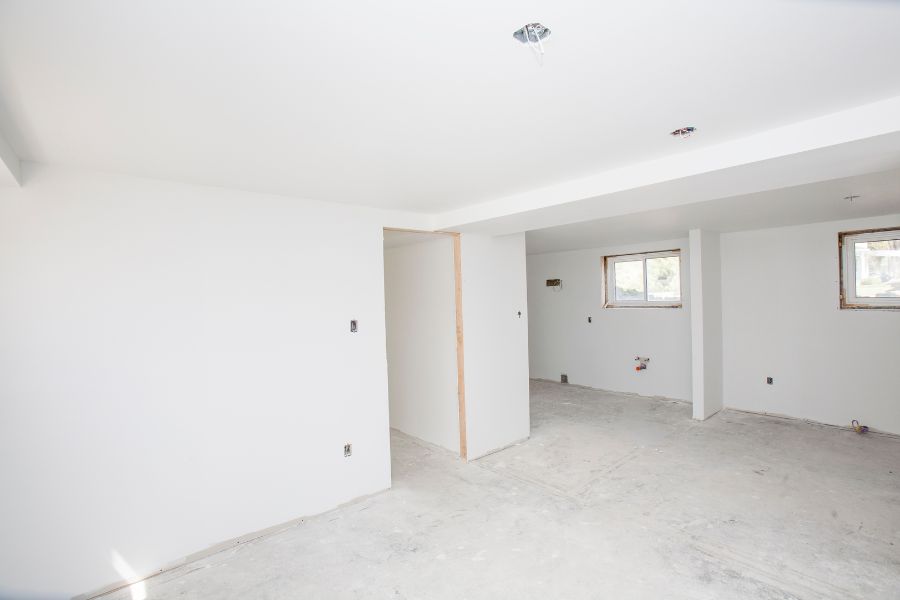
Many paints also contain these VOCs, and the chemical vapors can continue to off-gas for up to months. It means that if you paint the basement with a high VOC paint, you are more exposed to toxic gasses for longer.
Therefore, only go for paints with zero or low VOCs to stay safe. This way, you can significantly limit your exposure to such toxic chemicals.
9. Testing Radon
Unfortunately, over 21,000 people die annually due to lung cancer caused by being regularly exposed to radon inside homes.
It is an odorless gas that develops from the natural decomposition of uranium in rock, soil, or water. It gets into our homes through the absent floors, joints, foundations, walls, and other openings.
Going for a professional radon test is highly recommended. With this test, you will find out whether your home has a radon problem or not.
If dangerous radon levels are found in your home, you don’t have to leave your house or move. Instead, the solution is to use a radon mitigation system to pump the gas out of the home and into the air outside.
10. Removing Plants From Your Basement
Potted plants seem to work like a charm to add more life to your basement. However, it would help to think twice before turning your basement into a garden.
Surely, plants produce oxygen and can reduce airborne pollutants. But when talking about VOCs, plants cannot help much.
Moreover, the soil of potted plants can introduce more humidity in the basement. If your house is mold-prone, you have to avoid all of this.
These plants can create more problems for you in the long run. Instead, you need to go for an air purifier to clean your basement air. It works way faster than plants and provides guaranteed results.
Final Word
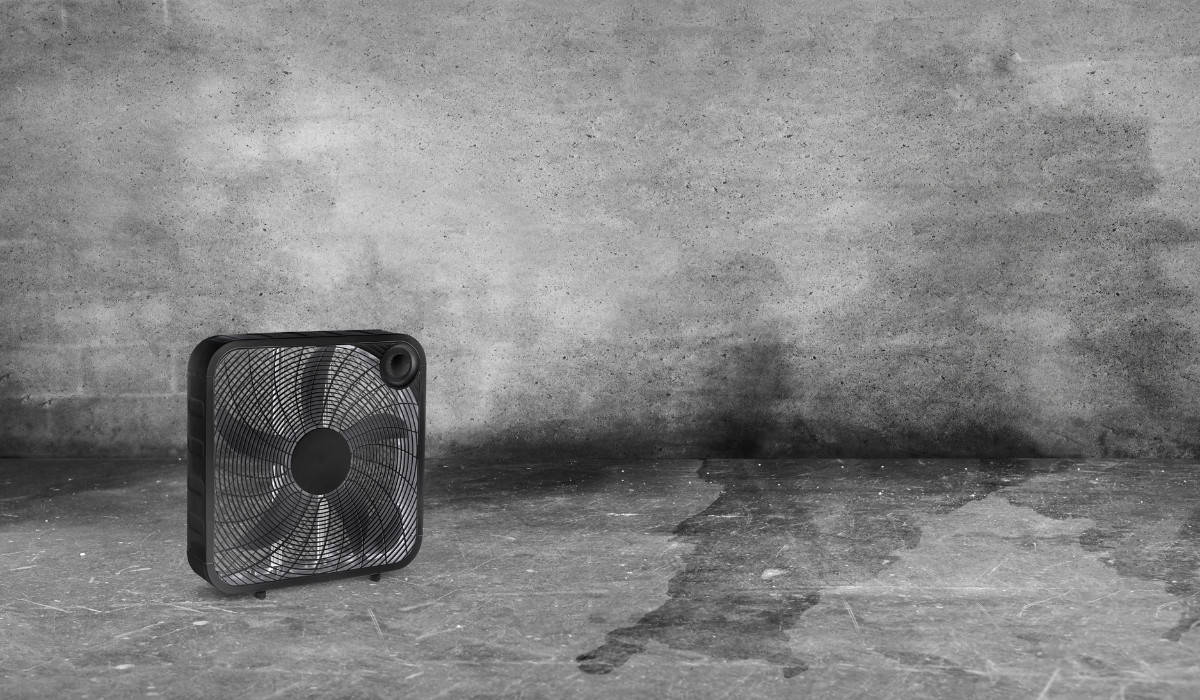
Improving basement air quality is critical not only for your health but for the betterment of your property.
With poor air quality, mold and mildew can develop, and it will start damaging your home slowly but surely. Therefore, make sure that you keep your basement clean and adequately ventilated.
Also, ensure that you get rid of any chemicals or solvents in your basement. Invest in a quality dehumidifier and an air purifier, keep unused stuff out of your basement, and put it in your outdoor shed or garage.

